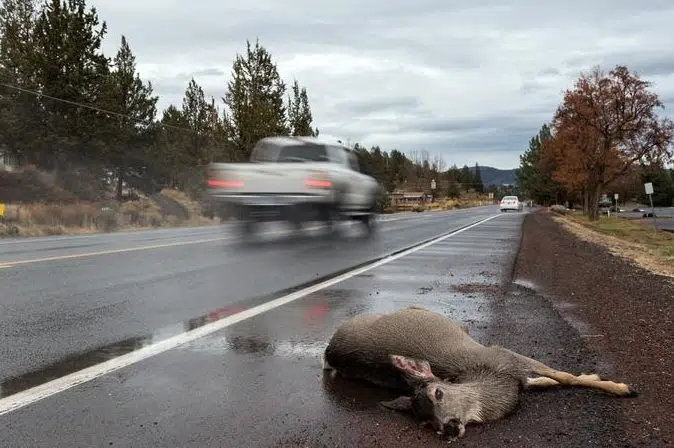By Ronald Quaroni
Saskatchewan residents hoping to turn roadside deer into dinner will have to pump the brakes.
The State of California passed legislation on Oct. 13 that allows the creation of programs to grant Golden State residents the ability to harvest animals that died as a result of accidental vehicle collisions.
A Prince Albert-based employee of the Ministry of Environment is not sure that’s a good idea.
“We don’t recommend (roadkill) for human consumption. Depending on the time of year, the carcass may have already started to decompose, and it might not be fit for human consumption,” Carrie McKay said. “We don’t know either if that animal was sick at the time of death.”
A big factor outlined in the California bill was wasted protein. According to estimates from the state, 20,000 deer are hit by vehicles every year.
“It is the intent of this act to make available to Californians tens of thousands of pounds of a healthy, wild, big game food source that currently is wasted each year following wildlife-vehicle collisions,” the bill stated.
SGI reported there were 12,748 deer collision claims reported in Saskatchewan in 2018.
McKay noted animals killed on Saskatchewan roads can be repurposed by residents. If roadkill is not first picked up by the Ministry of Highways or taken by scavengers, residents can make use of the animals, but only for specific purposes.
“The Ministry of Environment allows the retention of roadkill for personal uses like mounting or displaying, or pet food,” she explained.
McKay said if a person does collect an animal, they are responsible for reporting it to a conservation officer within seven days. Along with the report, she suggested the collector take photos as proof the animal was not taken illegally.
While it may be fit for the dog dish, McKay didn’t indicate roadkill would legally be allowed on human plates anytime soon.
“At this time the ministry has no plans to look at changing this legislation. I think what we have here in Saskatchewan is sufficient,” McKay said.
She encouraged anyone with questions to contact the conservation office at 1-800-567-4224.







